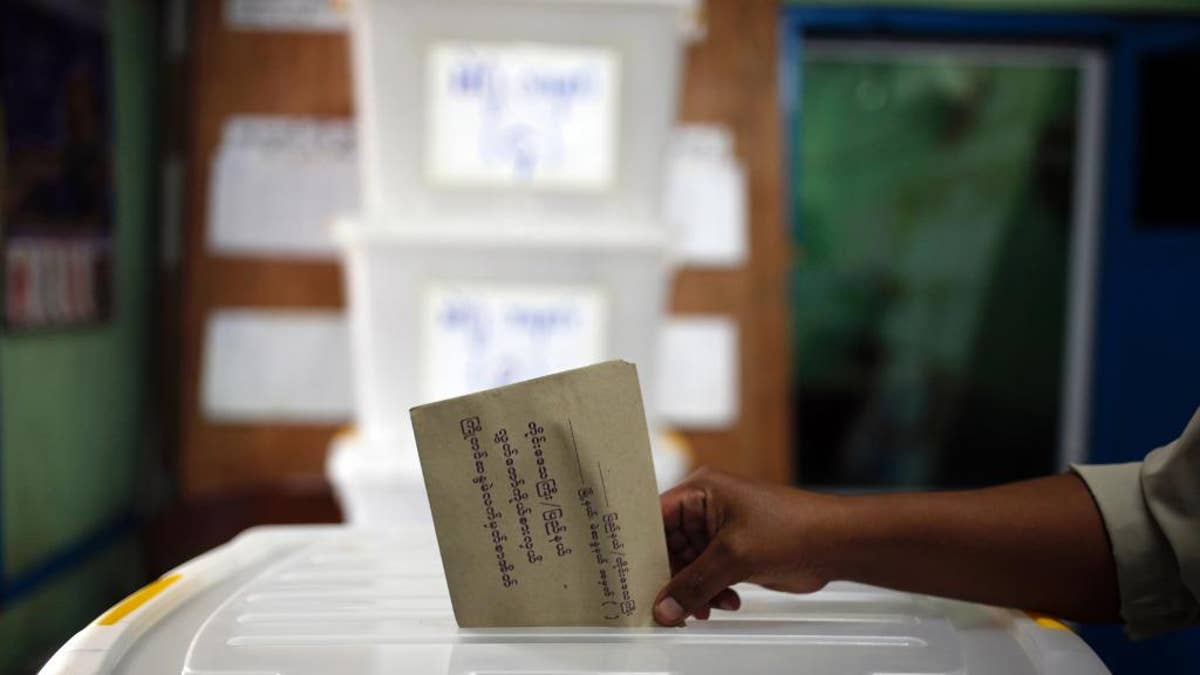
FILE - In this Friday, Oct. 30, 2015, file photo, a man casts his ballot in advance of the upcoming Nov. 8 general election at a township Election Commission Office in Mandalay, Myanmar. Myanmar will hold general elections on Sunday to choose representatives for both houses of Parliament, known as Pyidaungsu Hluttaw. (AP Photo/Hkun Lat, File) (The Associated Press)
YANGON, Myanmar – Myanmar will hold general elections on Sunday to choose representatives for both houses of Parliament, known as Pyidaungsu Hluttaw. A look at what's at stake:
___
PARTIES AND CANDIDATES: A total of 6,193 candidates from 91 parties are contesting the election. The main fight, however, is between the opposition National League for Democracy party led by Aung San Suu Kyi, and the military-backed Union Solidarity and Development Party, which is currently in power.
___
PARLIAMENT'S COMPOSITION: It is made up of the upper house, Pyithu Hluttaw, and the lower house, Amoytha Hluttaw. The lower house has 440 representatives, of which 330 will be elected. The remaining 110 seats, or 25 percent of the house, will be military personnel appointed by the commander-in-chief. The upper house has 224 seats, of which 168 will be elected and 56 will be similarly appointed by the military chief.
___
DIFFERENCE BETWEEN TWO HOUSES: The members of the more powerful, lawmaking lower house represent 330 townships, or constituencies, in the country. For the upper house, voters choose 12 representatives from each of Myanmar's 14 states and regions.
___
ELECTORAL SYSTEM: The candidate who gets the highest number of votes is elected, even if that person did not win an absolute majority.
___
VOTERS: About 30 million of Myanmar's 52 million people are eligible to vote. However, about 500,000 minority Rohingya Muslim voters have been ruled ineligible because the government considers them to be foreigners with no citizenship. Also not allowed to vote are members of religious orders, convicts, persons legally judged to be of unsound mind and bankrupts.
___
NEW VOTING PROCEDURES: The Union Election Commission, the state body conducting the polls, has introduced a number of changes for the 2015 elections that include stamps to mark ballots, tamper-proof ballot box seals that are individually numbered, and indelible ink to mark voters' fingers. Also, domestic and international observers will be allowed in the polling stations, and results will be displayed at each polling station after ballots have been counted.
___
AFTER THE ELECTIONS: Three electoral colleges will be formed comprising elected representatives of the upper house, the lower house and appointed military representatives from both houses. Each college will nominate one candidate for the president's post, and lawmakers from both houses will vote to choose three executive posts in February. The candidate with the highest number of votes will become the president and the other two will become vice-presidents.
___
SUU KYI AS PRESIDENT? While Suu Kyi is likely to be elected as a member of the lower house, she has been rendered ineligible to become president. A constitutional amendment designed to keep her out of power says anyone with a spouse or children who are citizens of another country cannot be the president. Suu Kyi's late husband and two sons are British.
___
OTHER ELECTIONS: In addition to the national parliament, the Nov. 8 vote is also to elect state and regional assemblies.
